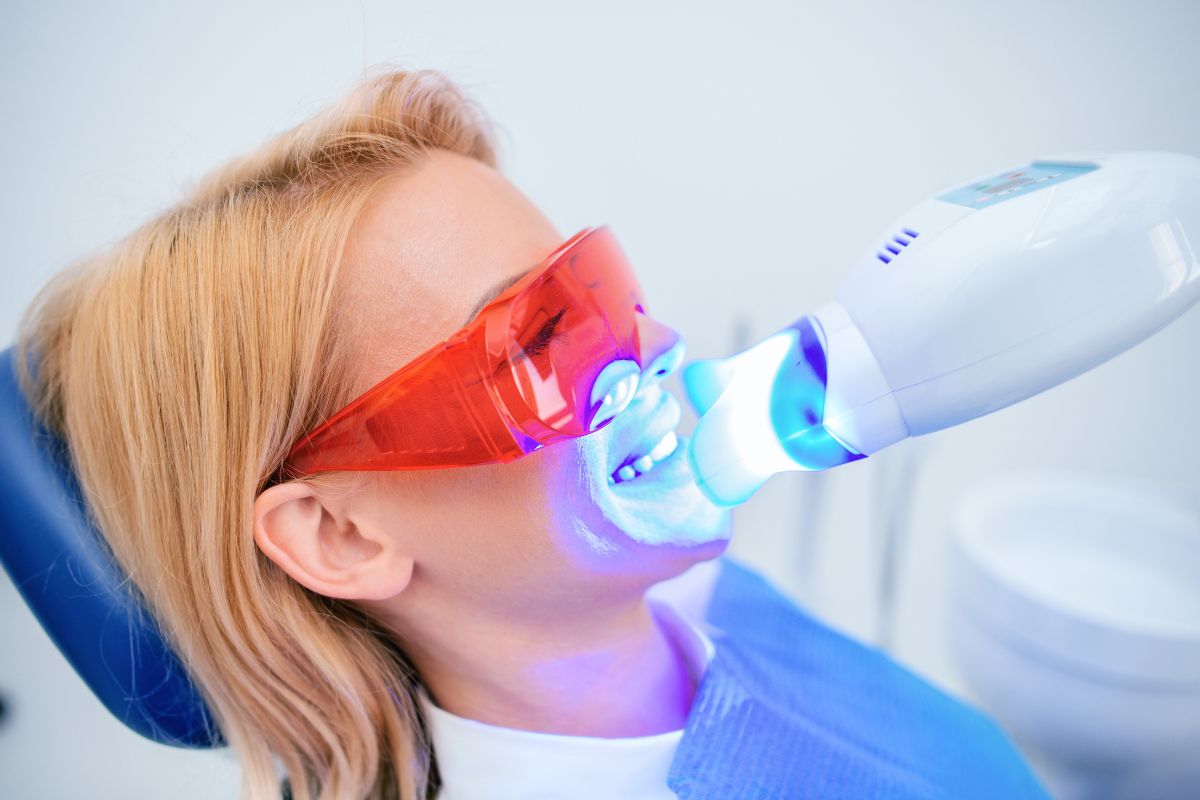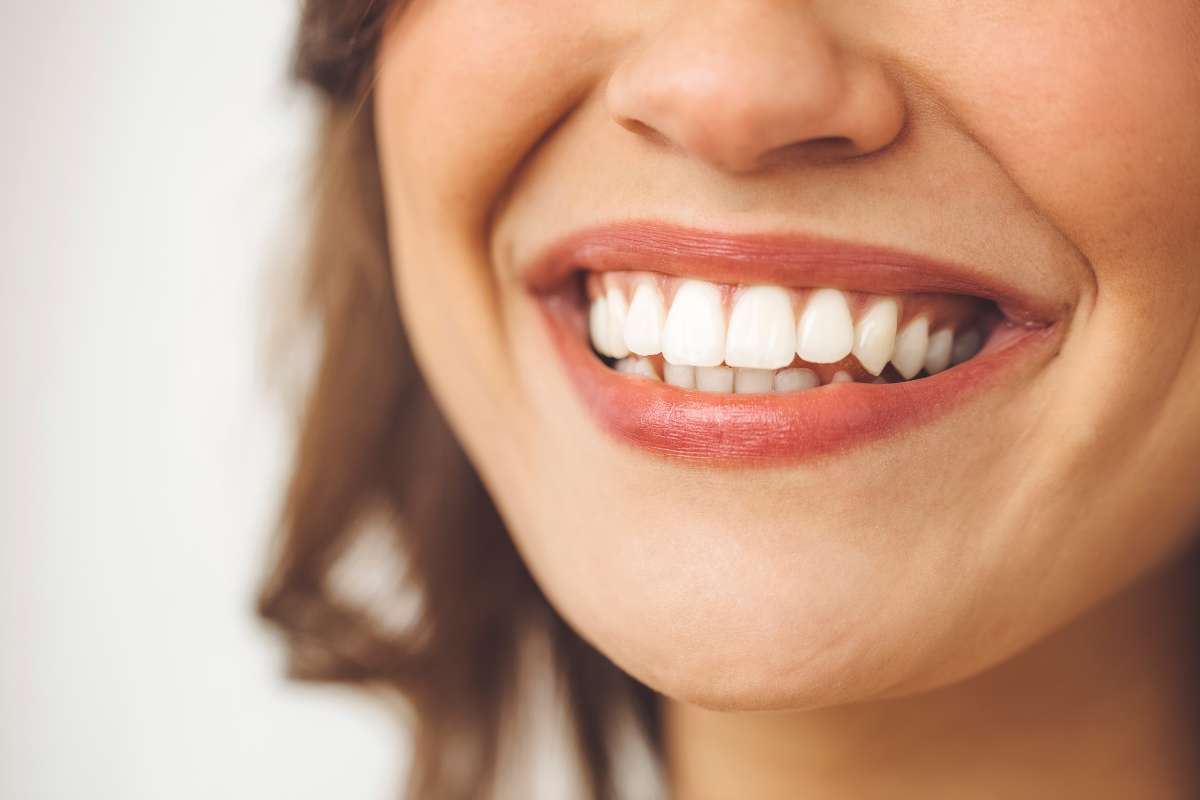Does Teeth Whitening Hurt?
A whiter smile can make a ton of difference! It can make you feel more confident and look healthier. And it’s easy to see why teeth whitening is one of the most popular cosmetic dental treatments.
While more and more are getting into the “teeth whitening fad,” some worry about pain and teeth sensitivity associated with the cosmetic procedure.
But does teeth whitening really hurt? You’ll discover the answer in this article!

The Truth Behind Teeth Whitening Pain
The truth? Teeth whitening will not most likely cause pain but may occasionally lead to sensitivity. And even when it does, it’s usually temporary and manageable.
Here’s what’s happening behind the scenes: most whitening products use hydrogen peroxide or carbamide peroxide. These ingredients work by breaking down stains on your enamel and penetrating into the dentin—the layer beneath the enamel where your tooth’s nerves live. That’s what gives you that freshly brightened look. But mind you, teeth whitening will not damage your enamel.
But because those ingredients go a bit deeper, they can also irritate the nerves in your teeth, especially if your enamel is already thin or your teeth are naturally sensitive. That irritation can feel like a sharp, quick “zing” of pain, a dull ache, or even sensitivity to hot or cold foods.
That said, not everyone experiences pain. Many people go through whitening treatments—especially those done under the care of a dentist—without any discomfort at all.
In rare cases, some do experience both pain and sensitivity after teeth whitening, especially if the bleaching solution has been applied too long. But the discomfort would only last for a day or two. Sometimes, it can linger for up to three days—but it rarely lasts longer than that.
The discomfort may come and go, or you might feel it more with hot, cold, or sweet foods. But rest assured—it’s almost always temporary.
If you’re planning to whiten your teeth but worried about the effects, here are five actionable tips to address post-teeth whitening sensitivity.
Which Whitening Treatments Would Likely Cause Discomfort
When it comes to comfort in dental procedures, it isn’t always guaranteed. Not all procedures are created equal—same for teeth whitening treatments.
For instance, typically teeth whitening in a controlled environment like Zoom whitening may pose less risk of teeth or gum irritation since it’s highly supervised by a dental professional. Dentists use protective barriers to shield your gums and can tailor the formula strength to your needs.
Over-the-counter whitening kits can still be effective, but they often cause more sensitivity because the trays or strips don’t fit well, and the gel can touch your gums.

How to Prevent or Reduce Whitening Pain
Here’s the good news: there are lots of ways to prevent or ease sensitivity, whether you’re whitening at home or in the dental chair.
Before whitening:
- Use a toothpaste designed for sensitive teeth (look for ingredients like potassium nitrate or stannous fluoride).
- Avoid acidic foods and drinks that can weaken enamel (think soda, citrus, and vinegar).
- Ask your dentist if a fluoride treatment beforehand could help strengthen your teeth.
During whitening:
- If using a take-home kit, don’t leave it on longer than directed.
- Use less gel if you notice it’s leaking onto your gums.
- Choose a lower-strength formula or take breaks between treatments.
After whitening:
- Skip very hot, cold, or sweet foods for a day or two.
- Drink through a straw to minimize contact with your teeth.
- Continue using sensitivity toothpaste and avoid whitening again until the discomfort fades.
Think of it like easing into a workout—you don’t need to go full speed right away. Being gentle with your smile during and after whitening can make all the difference.
Is Whitening Safe, Even If It Hurts?
Teeth whitening has always been considered safe and effective—when done properly. Sensitivity doesn’t mean something is wrong; it’s just your nerves' natural reaction to the peroxide. Still, it’s important to follow the directions on any whitening product you use—and better yet, choose professional teeth whitening to receive expert service and advice.
But remember, severe pain, swelling, or lingering discomfort isn’t normal after a teeth whitening procedure. If your teeth hurt a lot after whitening, or if the pain gets worse instead of better, it could be a sign of an underlying dental issue like a cavity or cracked tooth that needs attention.
When to call a dentist in Culver City? Go to your nearest dental clinic if:
- The pain lasts longer than 3 days
- You have sharp or shooting pain that keeps recurring
- You experience gum bleeding, swelling, or irritation
- You feel like something isn’t right
A Brighter Smile Doesn’t Have to Hurt
It’s totally normal to be a little nervous about teeth whitening, especially if you’ve heard stories about painful results. But here’s the truth: most people only experience mild and temporary sensitivity—if they feel anything at all. And with a few smart precautions, you can keep discomfort to a minimum.
Your dream smile shouldn’t come with a side of regret. Consult us at United Dental Care about the safest, most comfortable way to whiten your teeth. With the right approach, we can brighten up without the burn.




 By:
By: 

